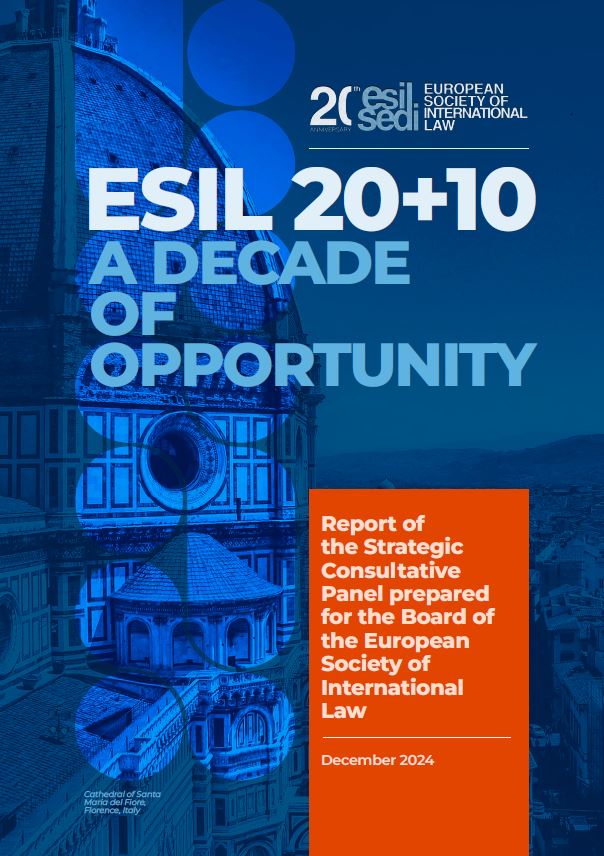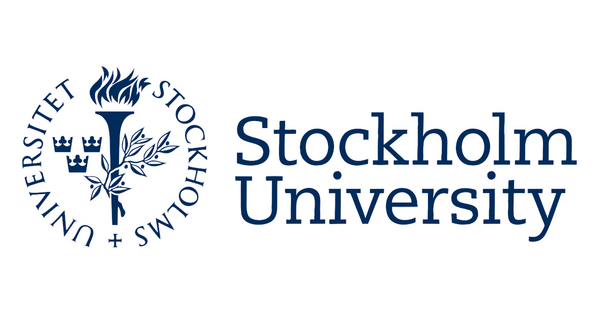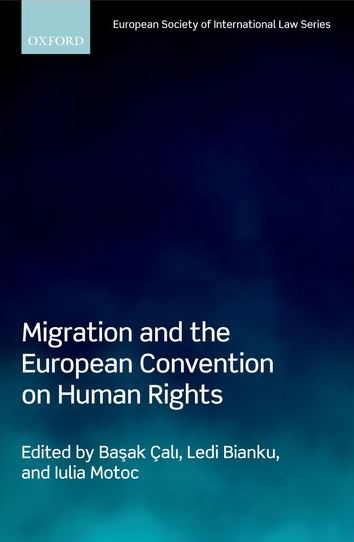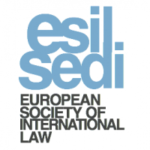ESIL 20+10 – A DECADE OF OPPORTUNITY | Report
ESIL 20+10: A Decade of Opportunity, created by the Strategic Consultative Panel for the European Society of International Law (ESIL), commemorates the Society’s 20th anniversary and sets a forward-looking agenda for its third decade. This comprehensive document serves as both a reflection on ESIL’s achievements and a strategic guide to ensuring its continued growth and impact in the field of international law.
READ THE REPORT
Overview of ESIL’s Journey
Founded in 2004 in Florence, ESIL emerged with the ambitious mission of uniting European international law scholars across cultural and linguistic divides to advance discussions on legal issues of importance to Europe and beyond. Over two decades, ESIL has evolved into a thriving, pluralistic platform that brings together legal scholars, practitioners, and institutions. It has become known for fostering inclusive and diverse dialogue, hosting prestigious events like Annual Conferences and Research Fora, and building a strong intellectual community.
Key Achievements Highlighted in the Report
1. Signature Events
ESIL’s Annual Conferences and Research Fora are cornerstones of its activity. These events serve as platforms for intellectual exchange and networking, attracting participants from across the globe. Recent themes have tackled pressing issues like fairness in international law and the impact of technological change.
2. Collaborative Activities
Beyond its flagship events, ESIL has initiated numerous collaborative projects with universities, sister societies, and international law institutions. Its 21 Interest Groups, covering areas from human rights to environmental law, enable members to engage deeply with specific topics.
3. Publications
ESIL has supported a diverse range of publications, including the ESIL-OUP book series, Reflections, and Papers. These publications highlight emerging debates and provide members with platforms to disseminate research.
4. Member-Driven Initiatives
ESIL has encouraged grassroots participation, resulting in workshops, hybrid events, and mentoring programs, especially for early-career scholars. However, the report notes a need to better balance these initiatives with broader organizational goals.
Looking Ahead: ESIL 365 – A Vision for the Future
The report introduces “ESIL 365,” an ambitious framework for evolving ESIL into a year-round intellectual and professional hub. The plan centers on three main priorities:
1. Shaping Intellectual Debates
-
Annual ESIL Lecture
This new initiative aims to feature distinguished speakers who will address pivotal topics in international law, fostering debate and mentorship across generations.
-
ESIL Leitmotif
An annual theme to guide the Society’s research and programming, encouraging coherence and collaboration across its activities.
-
Streamlined Publications
A proposed review of ESIL’s publications will focus on creating high-quality, impactful formats that showcase the expertise of its members while addressing shifts in the publishing landscape.
2. Building Partnerships
-
Stronger Ties with Europe-Based Institutions
ESIL plans to deepen collaborations with organizations like the European Court of Justice and the European Court of Human Rights. Such partnerships will allow members to engage more directly with key institutions in international law.
-
Engagement with Practitioners
The Society aims to attract more practitioners from government, international organizations, and law firms, enriching its membership and expanding its practical impact.
-
Closer Collaboration with Sister Societies
ESIL intends to partner with national and regional learned societies, particularly in underrepresented countries, to enhance its reach and influence.
3. Strengthening Structures
-
Support for Early-Career Members
Building on existing initiatives, ESIL plans to integrate mentorship opportunities into its core activities and create tailored events for doctoral researchers and young professionals.
-
ESIL Assistants Scheme
This program will provide early-career lawyers with hands-on experience in ESIL’s governance and activities, enhancing their professional development.
-
Advisory Council
A new body composed of experienced ESIL members will provide strategic guidance and foster connections with external networks.
Recommendations and Proposals
The report outlines ten actionable proposals, grouped into three thematic categories:
1. Shaping Debates:
- Establishing an annual lecture series and a Leitmotif.
- Prioritizing impactful and accessible publications.
2. Building Partnerships:
- Strengthening connections with Europe-based institutions and sister societies.
- Actively engaging with practitioners to bridge academia and practice.
3. Strengthening Structures:
- Expanding mentorship programs for early-career members.
- Introducing an ESIL Assistants Scheme and an Advisory Council for governance support.
Addressing Challenges
While celebrating its successes, the report identifies areas for improvement:
- Geographic Diversity: Membership is concentrated in a few countries. ESIL aims to attract more members from underrepresented regions.
- Practitioner Involvement: A stronger emphasis on practitioner engagement will diversify perspectives within the Society.
- Organizational Capacity: With its growing activities, ESIL needs enhanced structural support to maintain balance and efficiency.
A Decade of Opportunity
The report envisions ESIL as a leader in shaping international law discourse in Europe and beyond. By addressing its structural challenges and seizing opportunities for collaboration and innovation, ESIL aims to serve as both a convenor and an agenda-setter in the field.
This document is a roadmap for growth, emphasizing inclusivity, intellectual leadership, and sustainability. It invites members and partners to contribute to a thriving future for international law, making ESIL not just a society but a community for year-round engagement.
STRATEGIC CONSULTATIVE PANEL |
||
Members |
Co-Chairs |
Advisers and Assistants |
| Prof. Laurence Boisson De Chazournes | Prof. Neha Jain | Ms. Joyce Davies |
| Prof. Jutta Brunnée | Prof. Christian J. Tams | Ms. Anna Di Biase |
| Prof. Gleider Hernández | Mr. Antoine De Spiegeleir | |
| Prof. Lauri Mälksoo | Ms. Chloe Young | |
| Dr Matina Papadaki | ||
| Prof. Anne Peters | ||



